NegozioSEO aiuta a configurare SEO per post e pagine del blog su Shopify in modo che abbiano più visibilità online tra i tuoi potenziali clienti. StoreSEO si assicura che tutto sia in ordine mostrando un punteggio SEO e tutti i problemi che devono essere risolti per ottenere un buon punteggio SEO per il tuo post del blog Shopify. Questa documentazione coprirà tutto questo.
Prima di iniziare, assicurati di aver aggiunto un post del blog e installata l'app StoreSEO sul tuo Negozio store. Quindi, segui queste linee guida passo-passo per scoprire come ottimizzare il post del blog con StoreSEO.
Passaggio 1: vai a StoreSEO Blog Post Optimization #
Accedi al tuo negozio Shopify. Quindi, dalla barra di ricerca in alto o da 'Applicazioni' opzione nella barra laterale sinistra, cerca l'app StoreSEO e cliccaci sopra. Dalla dashboard StoreSEO, vai su 'Ottimizzare SEO' scheda. Ora clicca sulla scheda 'Post del blog' opzione.
Una volta che i tuoi post del blog sono sincronizzati correttamente, vedrai l'elenco dei tuoi post del blog in questa pagina. Scegli quello che vuoi ottimizzare e clicca su 'Risolvi il problema' pulsante.
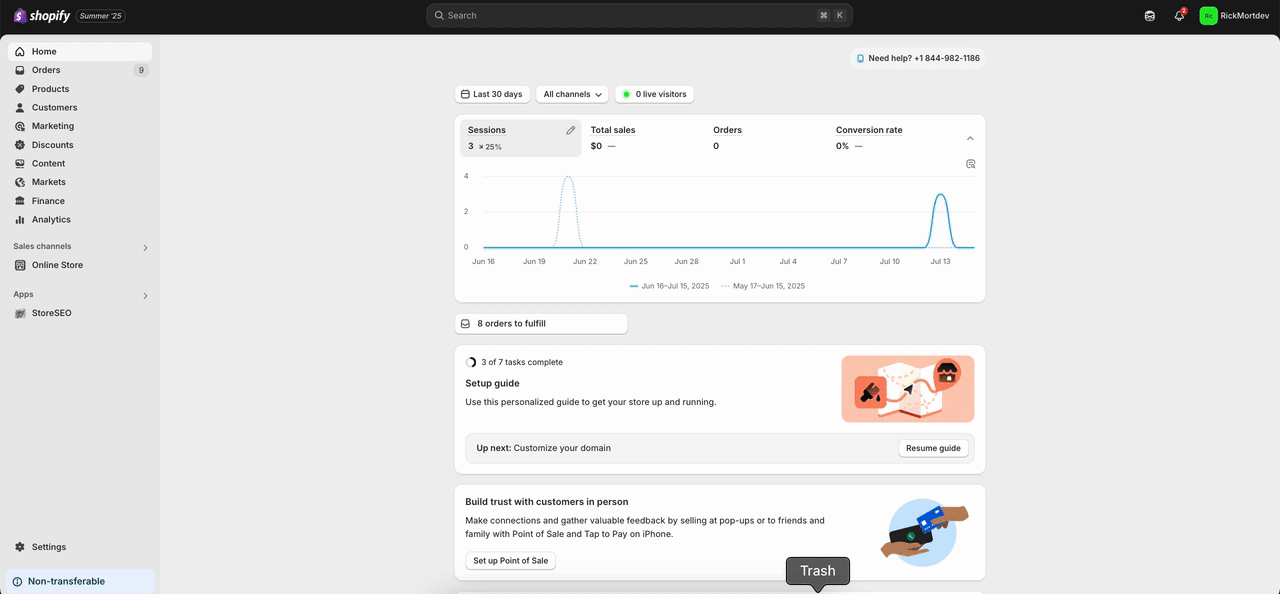
Passaggio 2: ottimizza il tuo post sul blog su Shopify #
Adesso è il momento di ottimizzare SEO per il tuo post sul blog Shopify. Come puoi vedere nell'immagine qui sotto, i dettagli SEO del tuo blog selezionato sono mostrati da StoreSEO. Dal pannello laterale destro, troverai anche Analisi SEO di base E Analisi SEO dettagliata per individuare i fattori chiave su cui intervenire per migliorare il punteggio SEO.
Analisi SEO di base #
Cominciamo con Analisi SEO di base. Qui, dobbiamo garantire vari criteri come l'inserimento di una parola chiave di messa a fuoco unica nei punti richiesti, il mantenimento di una lunghezza ottimizzata del meta titolo e della descrizione e altri. Ora ti mostreremo come fare queste cose una per una.
La parola chiave principale è unica #
Per prima cosa, devi scegli la parola chiave di messa a fuoco appropriata. Questo è fondamentale perché il blog è indicizzato sui motori di ricerca in base a questa parola chiave. Per dirla in parole povere, i tuoi potenziali lettori o pubblico avranno maggiori probabilità di trovare il tuo post del blog se la loro parola chiave di ricerca e la tua parola chiave di focus selezionata corrispondono.
Pertanto, è necessario prestare molta attenzione e farlo ricerca di parole chiave adeguata quando si sceglie la parola chiave di messa a fuoco. Ecco alcune cose da considerare:
Pertinenza delle parole chiave: Assicurati che la parola chiave sia pertinente all'argomento del tuo blog, al tuo business, al tuo pubblico e alla tua nicchia. Supponiamo che tu stia vendendo scarpe eleganti in pelle. La tua parola chiave principale dovrebbe essere pertinente a questo prodotto. Ora, selezioni una parola chiave con un volume di ricerca elevato contenente il termine 'borsa di pelle' O 'camicia formale. Queste parole chiave sono esterne alla nicchia del tuo prodotto. Quindi, anche se potrebbe avere un volume di ricerca più elevato, non sarà un'opzione rilevante.
Volume di ricerca: Le parole chiave con volume di ricerca più elevato hanno più ricerche ogni mese. Se selezioni parole chiave con volume di ricerca più elevato, è più probabile che tu affronti più concorrenza. Più parole chiave specifiche utilizzi, più precisamente puoi raggiungere il tuo pubblico di destinazione.
Ora, se scegli una parola chiave con focus lungo come 'Scarpe formali in pelle sintetica resistente all'acqua', hai una parola chiave unica ma ci sono meno possibilità che i clienti utilizzino questa parola chiave intera durante una ricerca. Ecco perché non ha un buon volume di ricerca come mostrato nell'immagine qui sotto.
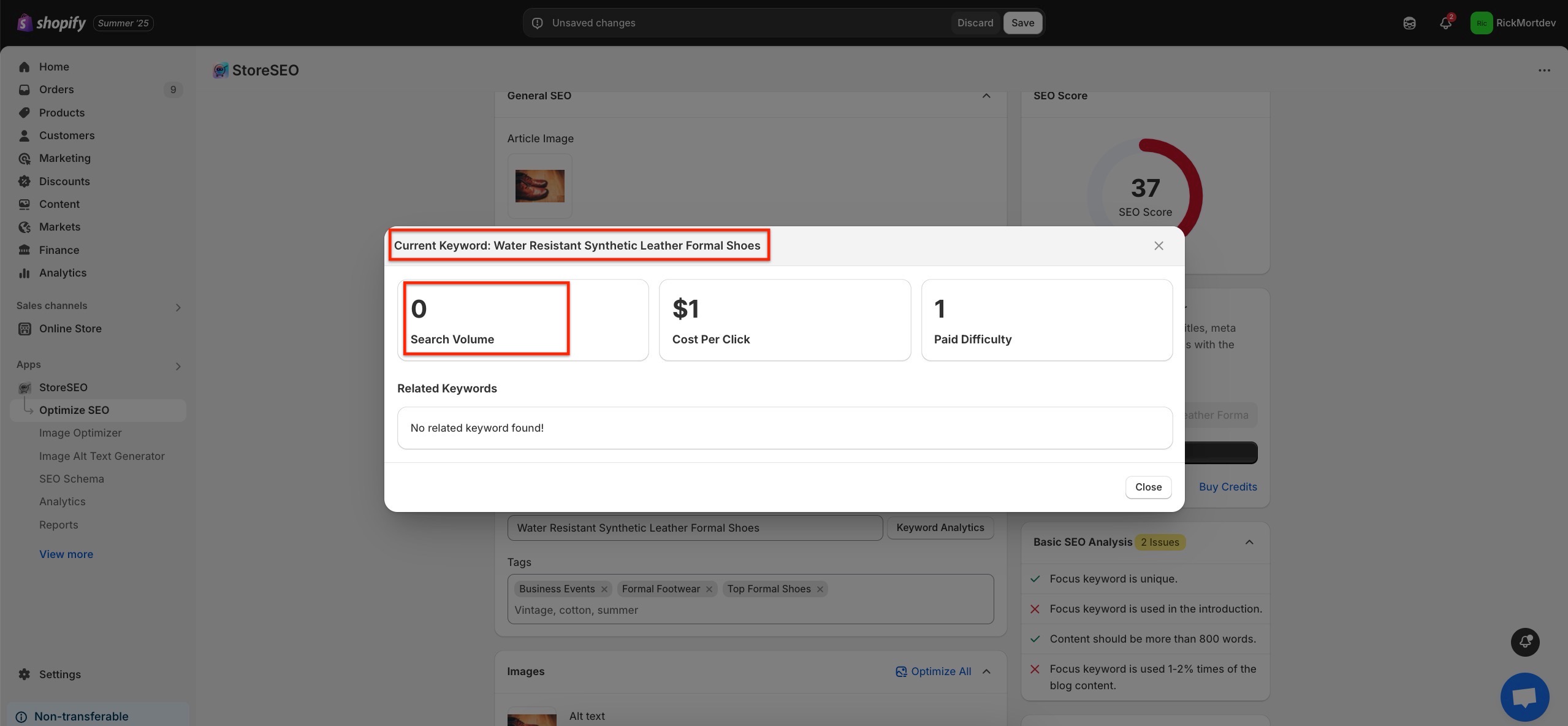
Ora, se scegli una parola chiave con un focus breve come 'Scarpe in pelle', scoprirai che ha un volume di ricerca elevato, come mostrato nell'immagine sottostante. Tuttavia, parole chiave così popolari hanno troppo traffico e sarà molto più difficile classificarle e raggiungere il tuo pubblico.
D'altra parte, se selezioni la parola chiave di messa a fuoco 'Scarpe in pelle sintetica', hai un buon volume di ricerca (non troppo alto) e c'è una maggiore possibilità di indicizzazione senza dover affrontare molta concorrenza. Ecco perché questa è l'opzione di parola chiave di messa a fuoco più appropriata in questo caso particolare.
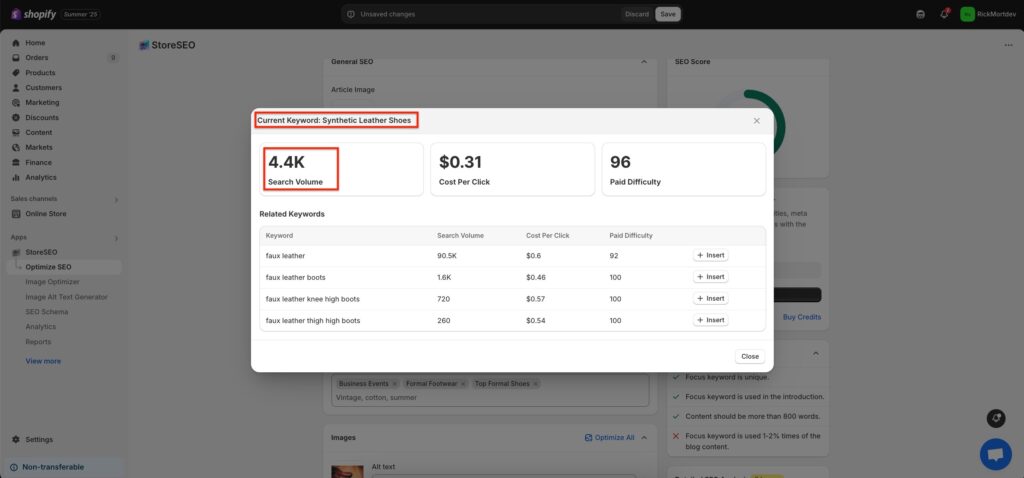
Costo per clic: Se stai pubblicando annunci con parole chiave specifiche, il costo per clic determina il budget approssimativo per la campagna pubblicitaria. Quindi, scegliere parole chiave con un costo per clic più elevato significa che devi avere un budget di campagna più grande. Si noti che si tratta di un valore stimato e non devi preoccuparti se non stai eseguendo alcun annuncio.
Difficoltà a pagamento: Rappresenta la domanda di parole chiave quando utilizzate in annunci a pagamento. Una difficoltà a pagamento più elevata indica che la parola chiave ha anche più concorrenza nella ricerca organica. Quindi, è una metrica importante durante la ricerca di parole chiave.
Parole chiave correlate: Ricordati di controllare le parole chiave correlate per una determinata parola chiave. Queste parole chiave correlate ti forniranno suggerimenti di parole chiave aggiuntivi. Quindi, potresti imbatterti in un'opzione di parola chiave di messa a fuoco migliore. Assicurati che le parole chiave correlate siano adatte al tuo prodotto, alla tua attività, al tuo pubblico e alla tua nicchia.
Torna all'ottimizzazione del post del blog su StoreSEO, inserisci la tua parola chiave preferita in 'Parola chiave di messa a fuoco' campo. Clicca sul 'Analisi delle parole chiave' pulsante per ottenere immediatamente il Volume di ricerca, Costo per clic, Difficoltà pagata E parole chiave correlate per la tua parola chiave.
Qui abbiamo selezionato 'Scarpe in pelle sintetica' come parola chiave principale. Si consiglia di utilizzare parole chiave principali diverse per post di blog diversi. Scegli una parola chiave in base alla tua attività e all'argomento del blog. ricerca di parole chiave per Shopify per questo.
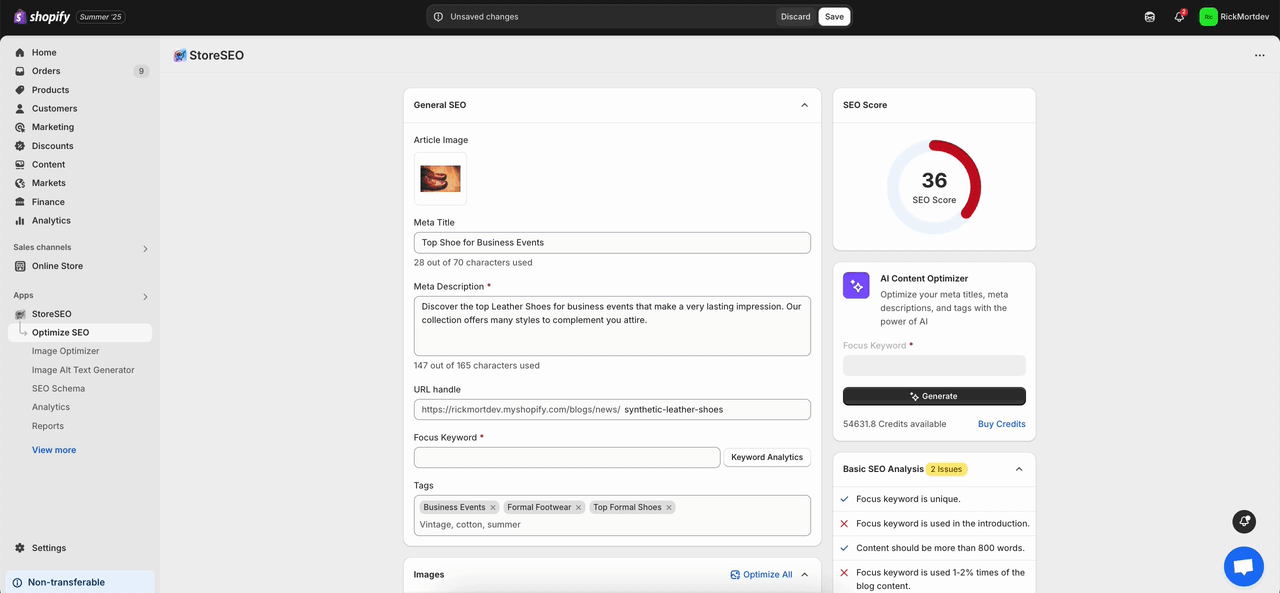
La parola chiave focus è utilizzata nell'introduzione #
Quindi, assicurati che la parola chiave focus sia usata nell'introduzione del post del blog. Per modificare il tuo post del blog, vai su Sales Channels nel pannello laterale sinistro della tua dashboard Shopify. Quindi, seleziona 'Negozio online' e clicca su 'Post del blog' opzione. Seleziona il blog che vuoi modificare. Assicurati di inserire la parola chiave principale nell'introduzione. Come puoi vedere nell'immagine qui sotto, l'introduzione del nostro blog contiene 'Scarpe in pelle sintetica' oppure la parola chiave selezionata.
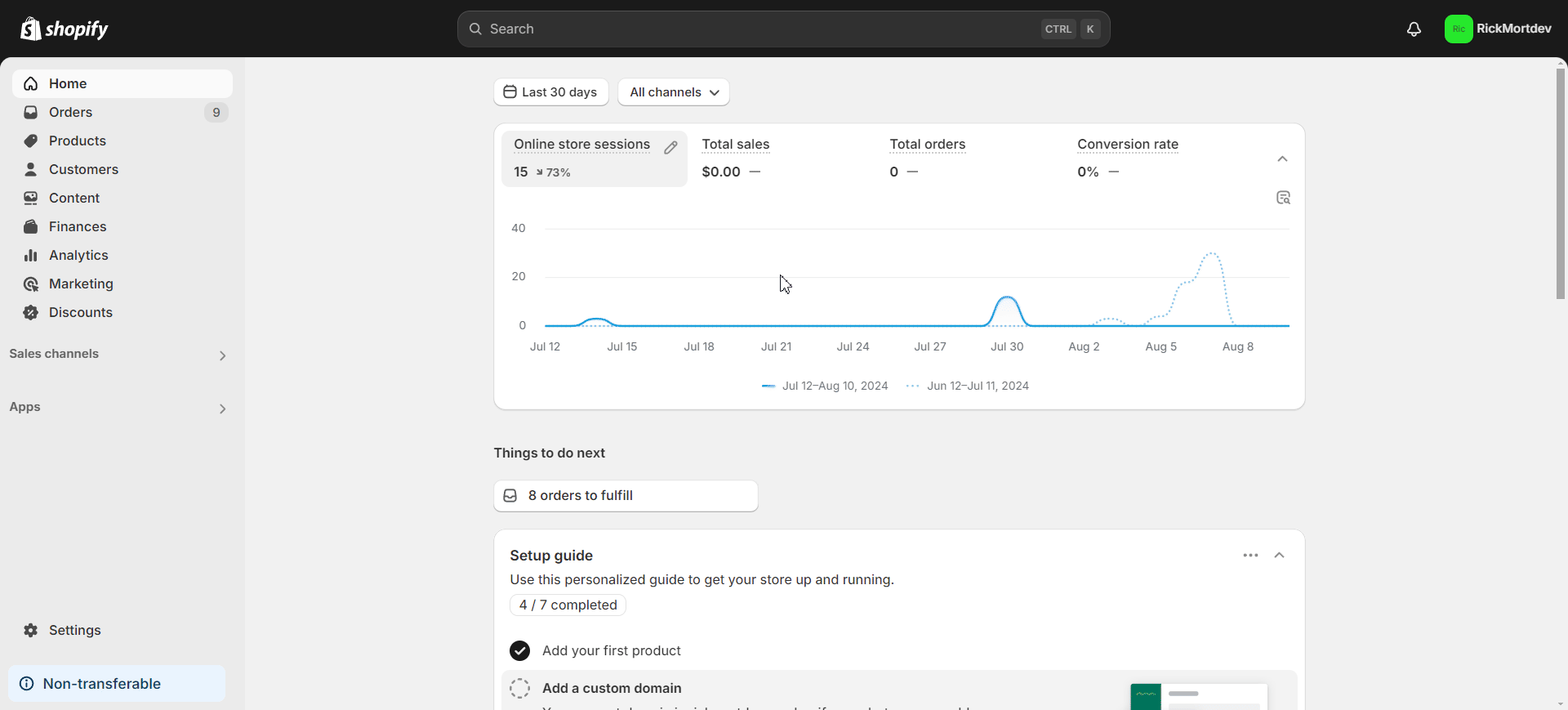
Il contenuto dovrebbe essere più lungo di 800 parole #
Includi più di 800 parole nel contenuto del blog per ottimizzare ulteriormente il punteggio SEO. Assicurati che il contenuto del tuo blog contenga più di 800 parole mantenendone la pertinenza e la significatività, come mostrato nell'immagine qui sotto.
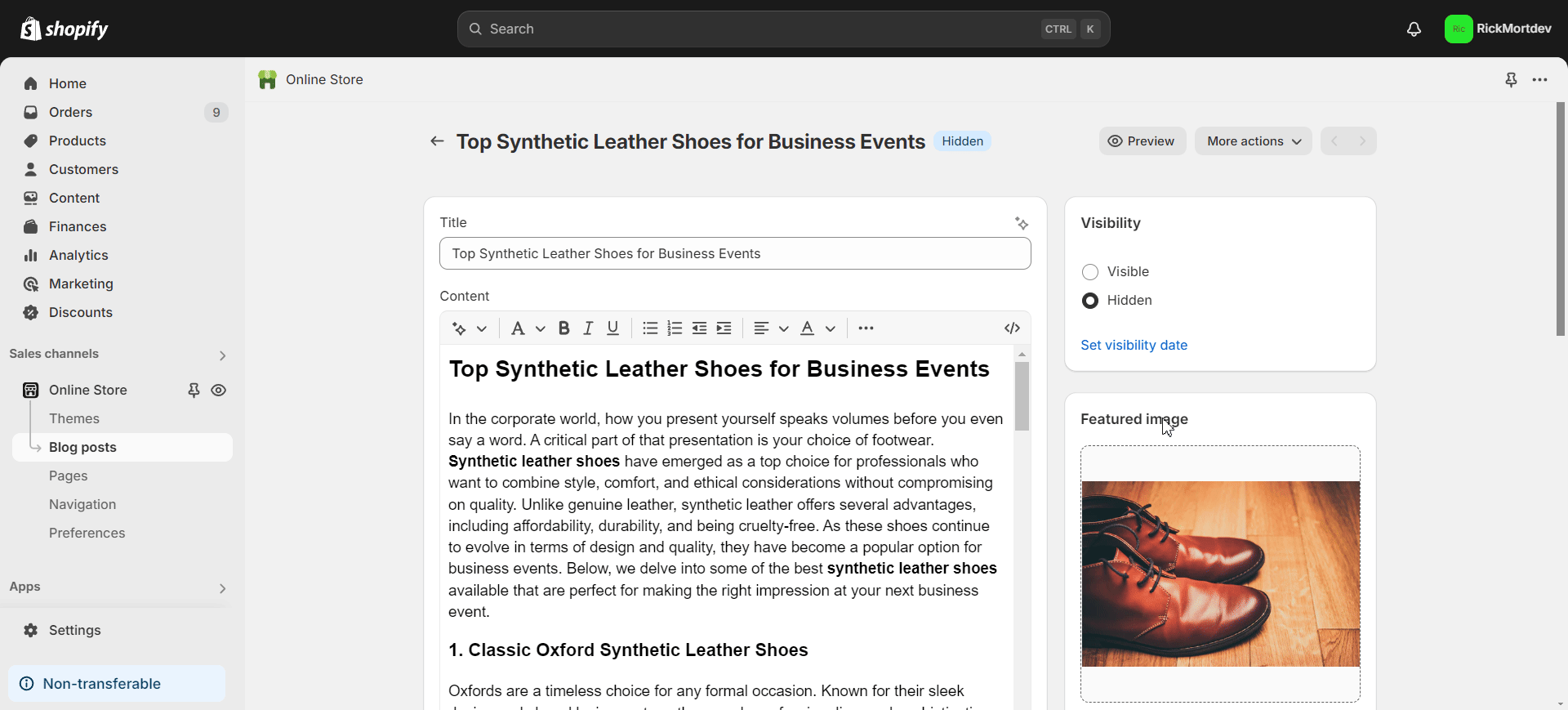
La parola chiave principale viene utilizzata 1-2% volte nel contenuto del blog #
La tua parola chiave principale dovrebbe essere usata 1-2% volte nel contenuto del blog. Ma evita di riempire di parole chiave o di posizionarle in modo forzato o innaturale. Come puoi vedere nell'immagine qui sotto, abbiamo posizionato la nostra parola chiave principale selezionata per mantenere la frequenza ideale menzionata sopra.
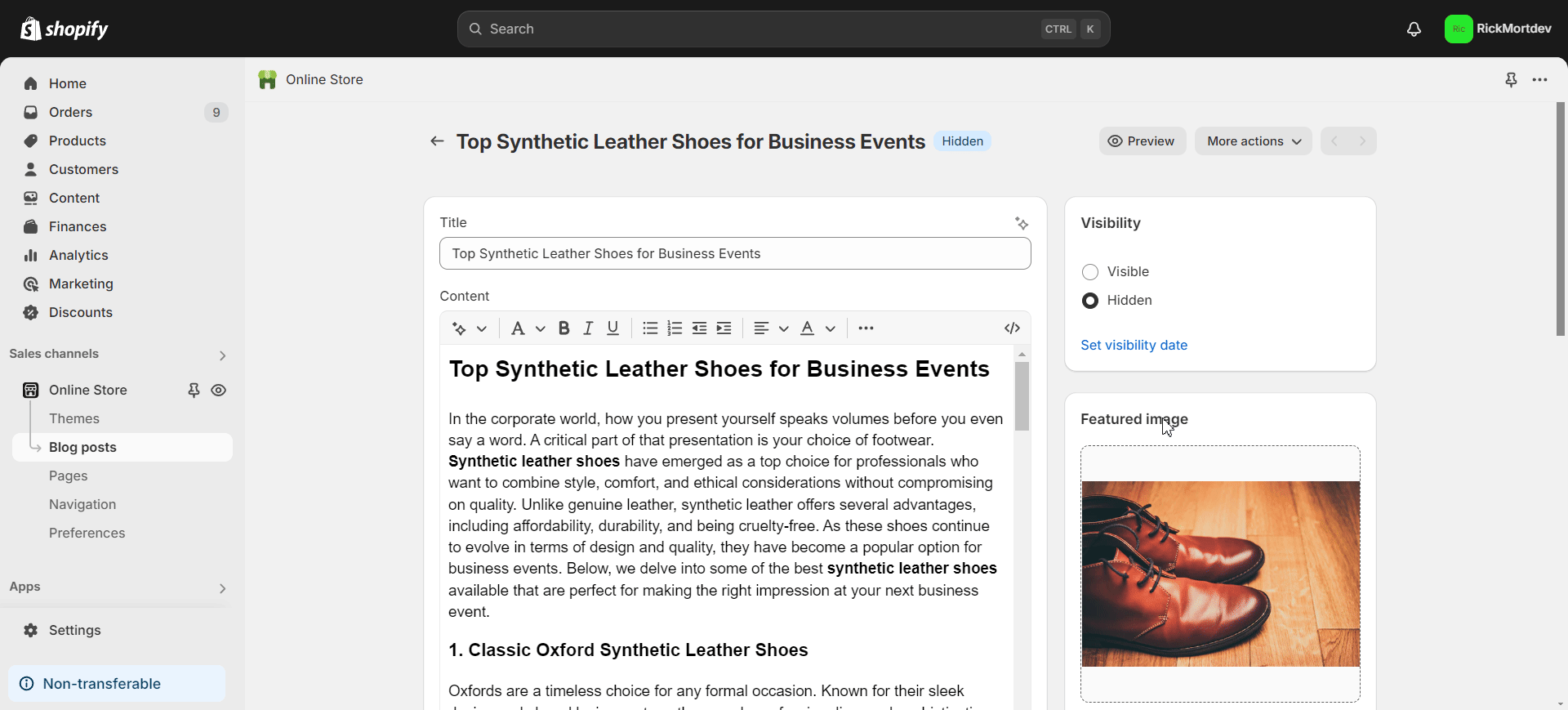
Analisi SEO dettagliata #
Procederemo ora alla Analisi SEO dettagliata. Per questo, dobbiamo assicurarci di posizionare la parola chiave focus nel testo alt dell'immagine, nei sottotitoli, nella meta descrizione e nell'URL e soddisfare alcuni altri requisiti. Lasciate che vi mostriamo come fare tutto questo.
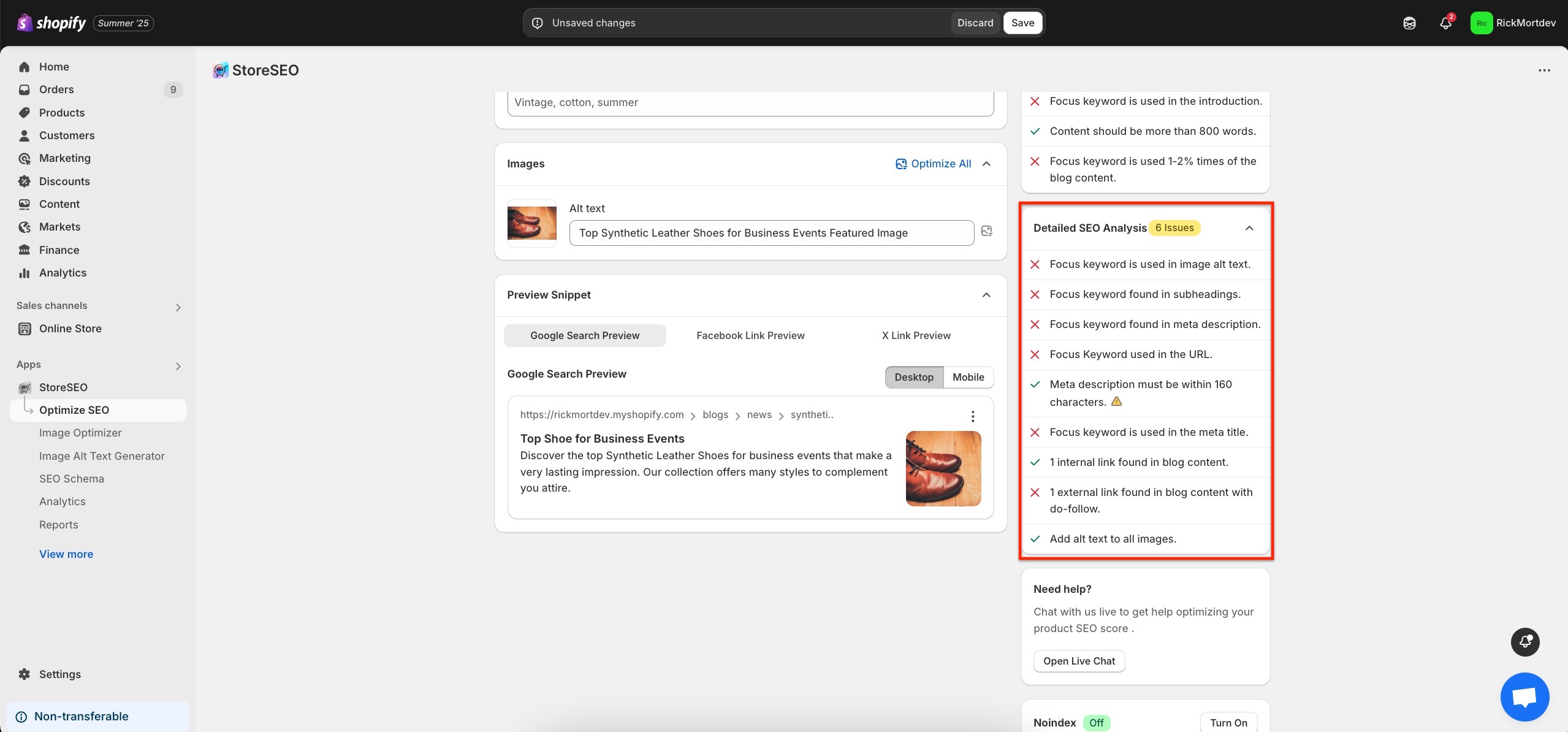
La parola chiave focus è utilizzata nel testo alternativo dell'immagine #
Assicurati che la parola chiave focus venga utilizzata quando aggiungi il testo alt dell'immagine dell'immagine in evidenza del blog. Per questo, vai su StoreSEO blog post optimization per il tuo blog desiderato. Sotto 'Immagini' sezione, troverete la 'Testo alternativo campo. Inserisci il testo alt desiderato contenente la parola chiave focus in questo campo.
Come puoi vedere nell'immagine sottostante, il campo di testo Alt 'Top Scarpe in pelle sintetica per l'immagine in evidenza del blog sugli eventi aziendali contiene la nostra parola chiave selezionata (contrassegnata in grassetto).
Parola chiave principale trovata nei sottotitoli #
Assicurati che i sottotitoli del tuo blog contengano la parola chiave principale. Puoi aggiungerla al tuo sottotitolo quando modifichi il tuo blog dalla dashboard di Shopify come discusso in precedenza. Come puoi vedere nell'immagine qui sotto, il nostro sottotitolo 'Classic Oxford Scarpe in pelle sintetica' contiene la nostra parola chiave selezionata (contrassegnata in grassetto).
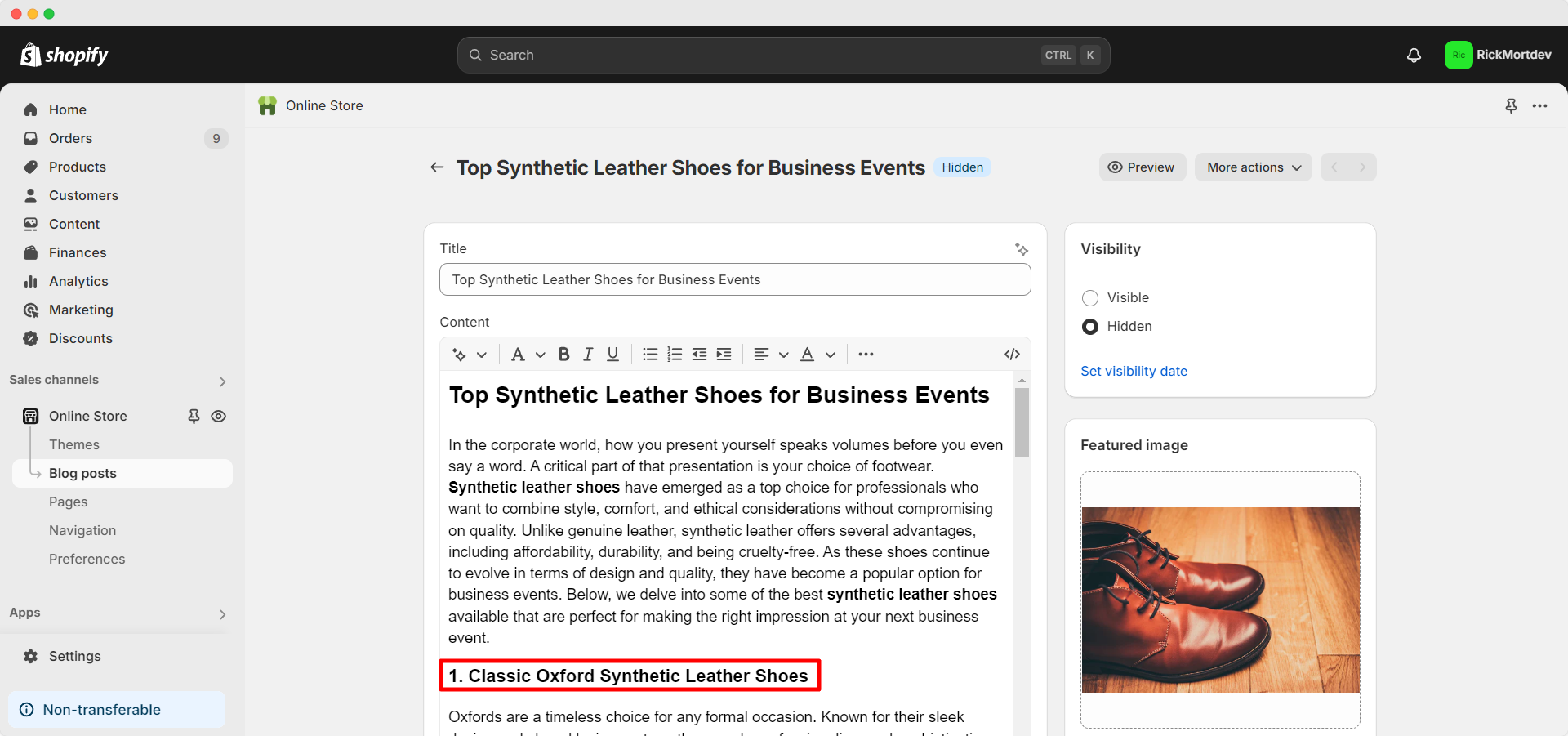
Parola chiave principale trovata nella meta descrizione #
La tua meta description dovrebbe contenere la parola chiave di messa a fuoco selezionata. Dall'ottimizzazione dei post del blog StoreSEO, puoi aggiungere la parola chiave di messa a fuoco nel campo della meta description. La nostra meta description è la seguente:
Scopri il top Scarpe in pelle sintetica per eventi aziendali che lascino un'impressione duratura. La nostra collezione offre una varietà di stili per completare il tuo abbigliamento.
Quindi, contiene la nostra parola chiave di messa a fuoco selezionata (contrassegnata in grassetto)
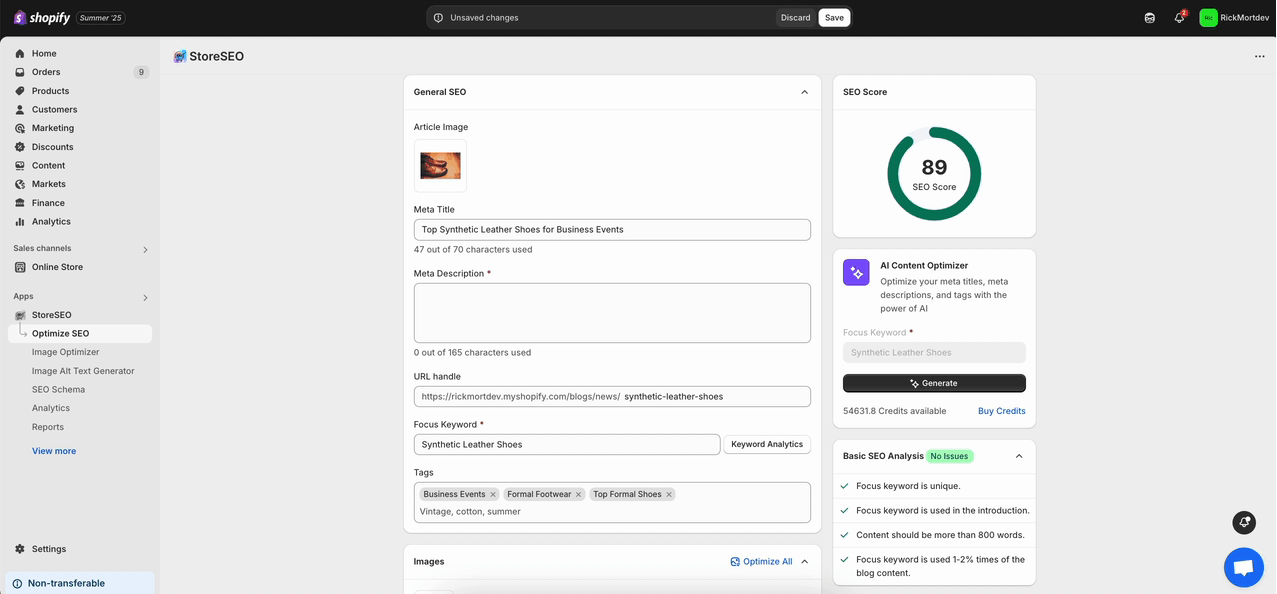
Parola chiave di messa a fuoco utilizzata nell'URL #
Assicurati che l'URL del post del blog Shopify contenga la parola chiave principale. Puoi modificare l'URL da sotto 'URL handle' quando ottimizzi il tuo post del blog con StoreSEO. Come puoi vedere, il campo URL contiene 'Scarpe in pelle sintetica' oppure la parola chiave selezionata.
Nota: Se il tuo post del blog è già stato indicizzato e desideri modificarne l'URL, ti consigliamo di creare un reindirizzamento URL.
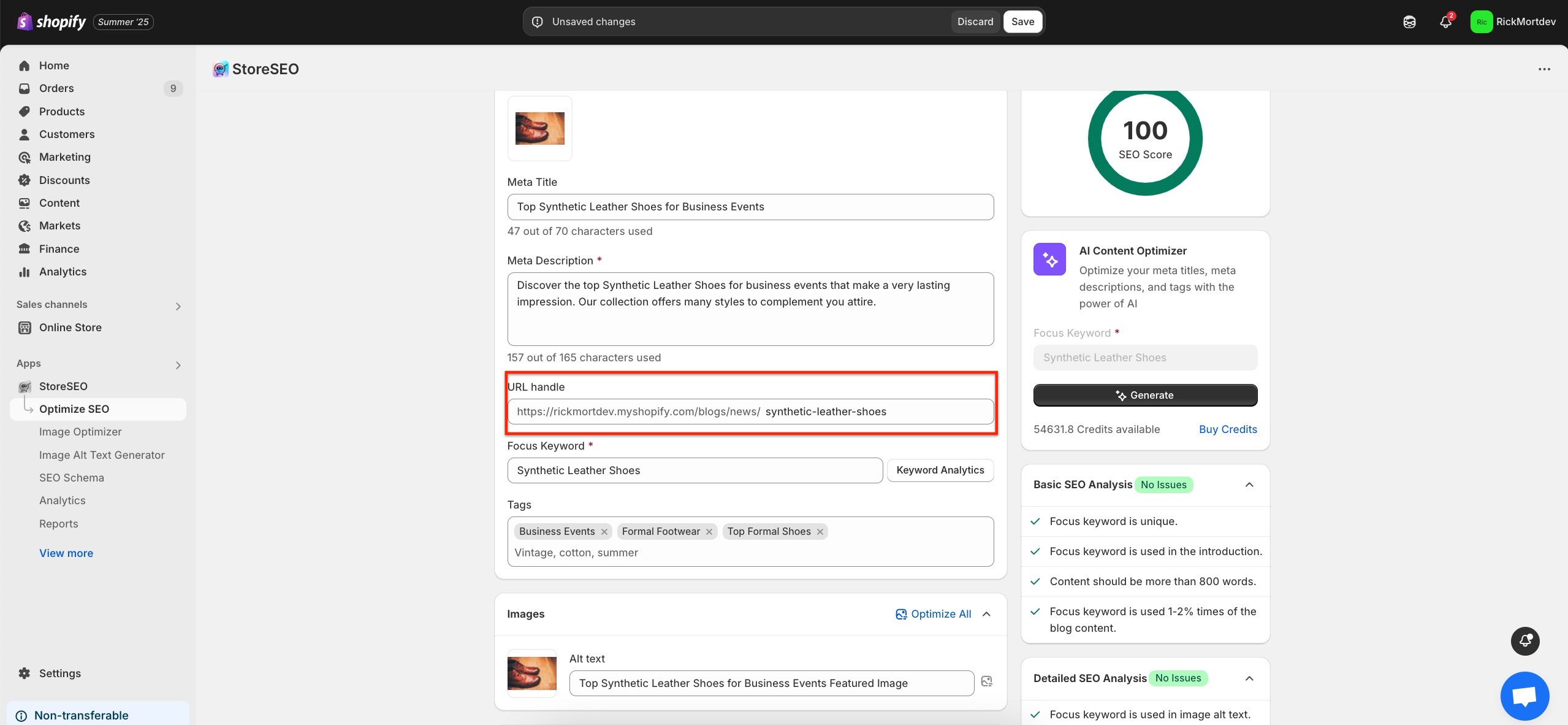
La meta descrizione deve essere lunga al massimo 160 caratteri #
Tuo meta descrizione del post del blog dovrebbe essere idealmente entro 160 caratteri. Come puoi vedere nell'immagine qui sotto, la nostra meta description è lunga 159 caratteri, il che soddisfa questo requisito.
La parola chiave focus è utilizzata nel meta titolo #
Assicurati che il tuo meta titolo contenga la parola chiave di focus selezionata. Come puoi vedere nell'immagine qui sotto, il nostro meta titolo è il seguente:
Superiore Scarpe in pelle sintetica per qualsiasi evento aziendale o contesto formale
Quindi, il meta titolo contiene la parola chiave da noi selezionata (contrassegnata in grassetto).
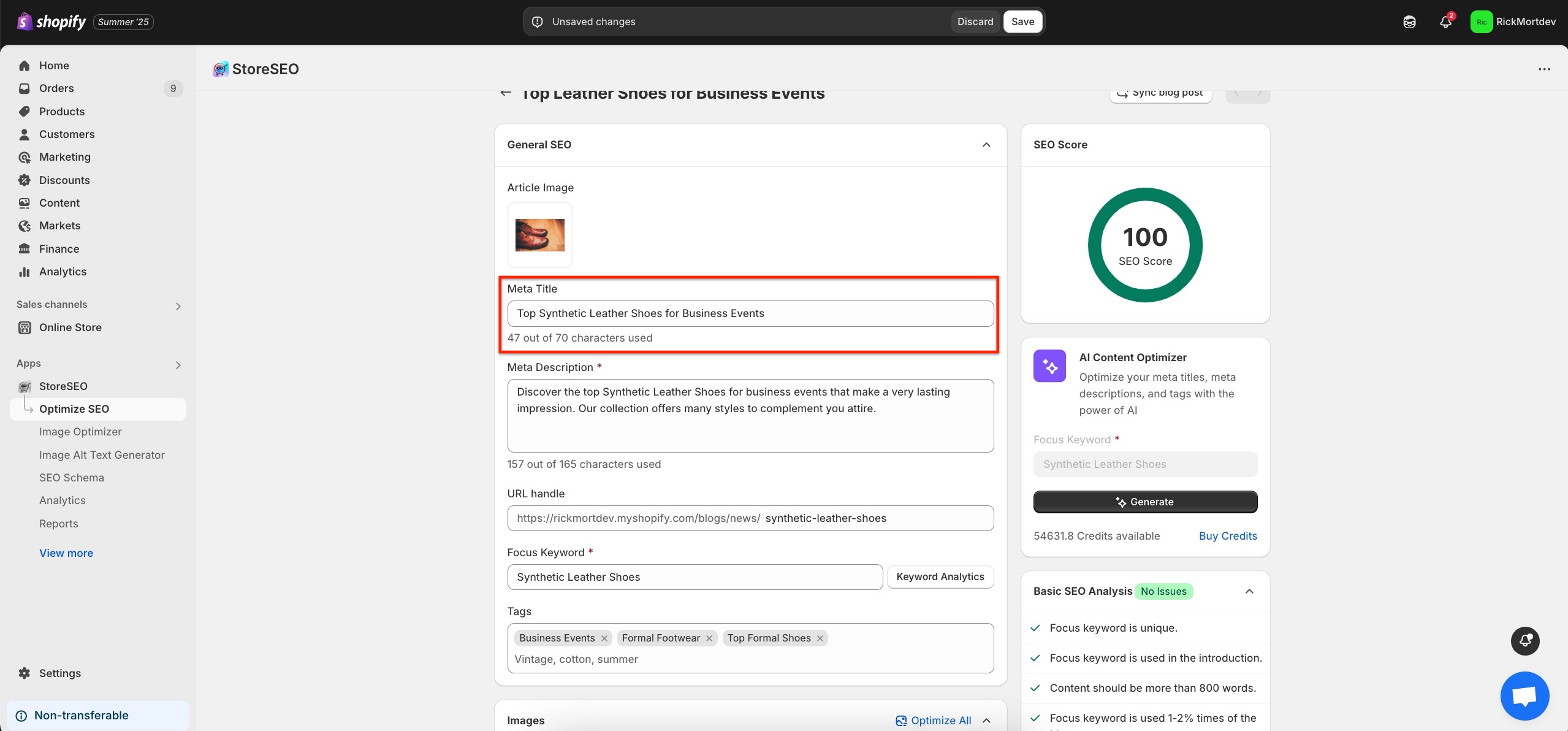
1 collegamento interno trovato nel contenuto del blog #
Il contenuto del tuo blog dovrebbe contenere 1 link interno. Link interno significa collegamento a un altro blog, pagina o prodotto del tuo negozio Shopify. Per aggiungerlo, procedi a modificare il tuo post del blog dalla dashboard di Shopify come descritto in precedenza. Seleziona le parole che vuoi impostare come testo di ancoraggio e clicca sull'opzione a tre punti in 'Contenuto' sezione. Quindi, seleziona la sezione 'Inserisci collegamento' opzione. Inserisci il link interno nel campo designato. Puoi anche scegliere se il link si aprirà nella stessa finestra o in una nuova finestra quando clicchi. Puoi anche impostare un titolo per il link. Fai clic su 'Inserisci collegamento' quando hai finito.
Prova a creare un collegamento a una pagina o a un post del blog del tuo negozio pertinente all'argomento del blog o al prodotto o servizio discusso nel tuo blog. Come puoi vedere nell'immagine qui sotto, abbiamo collegato internamente il nostro blog alla nostra pagina FAQ.
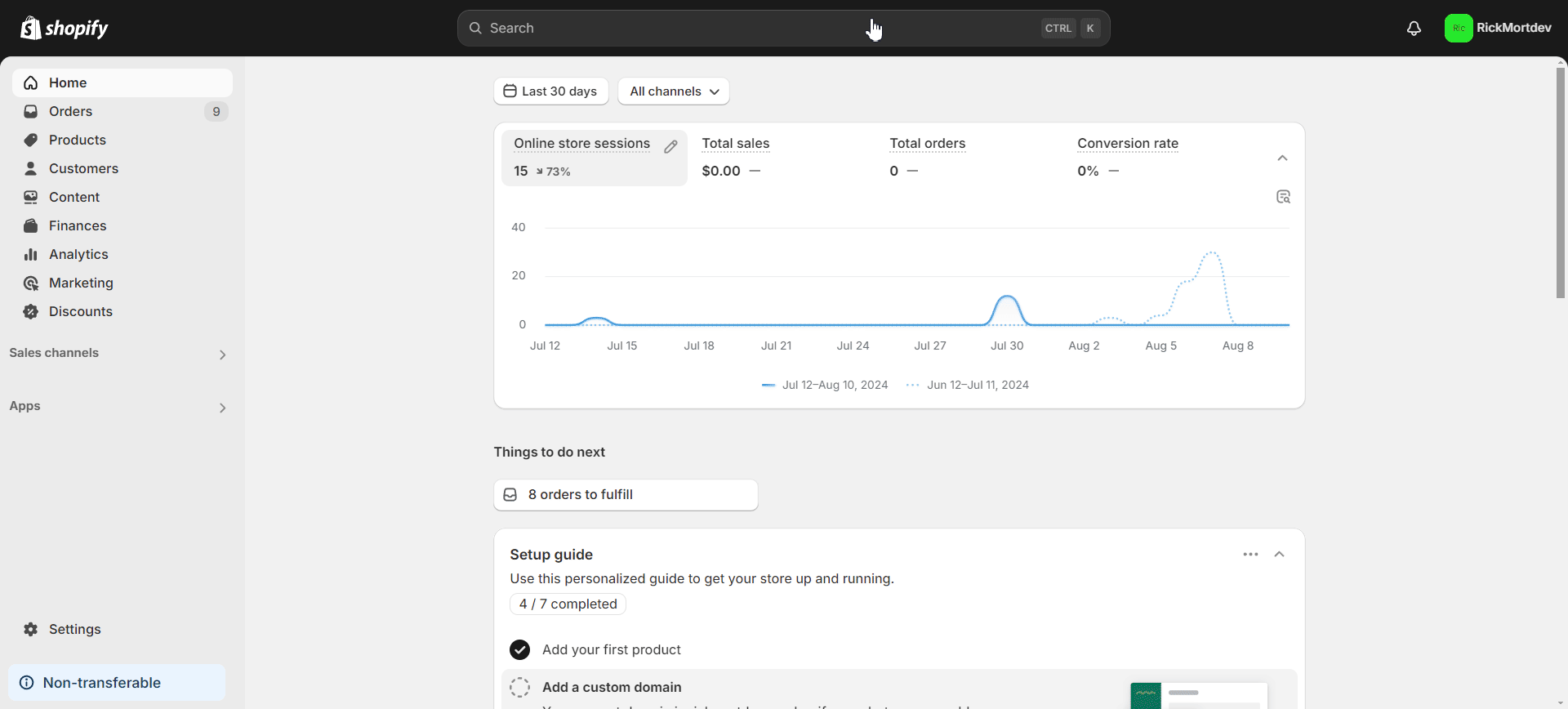
1 collegamento esterno trovato nel contenuto del blog con do-follow #
Mantieni un link esterno nel contenuto del blog con do-follow. Link esterno significa collegamento a pagine esterne al di fuori del tuo negozio Shopify. Includilo quando modifichi il tuo post del blog come mostrato nel punto precedente.
Prova a creare un collegamento a un link esterno di alta autorità di un post o di una pagina del blog. Inoltre, il link esterno dovrebbe essere pertinente all'argomento del blog o al prodotto o servizio discusso nel tuo blog. Come puoi vedere nell'immagine qui sotto, abbiamo incluso 1 link esterno nel contenuto del nostro blog.
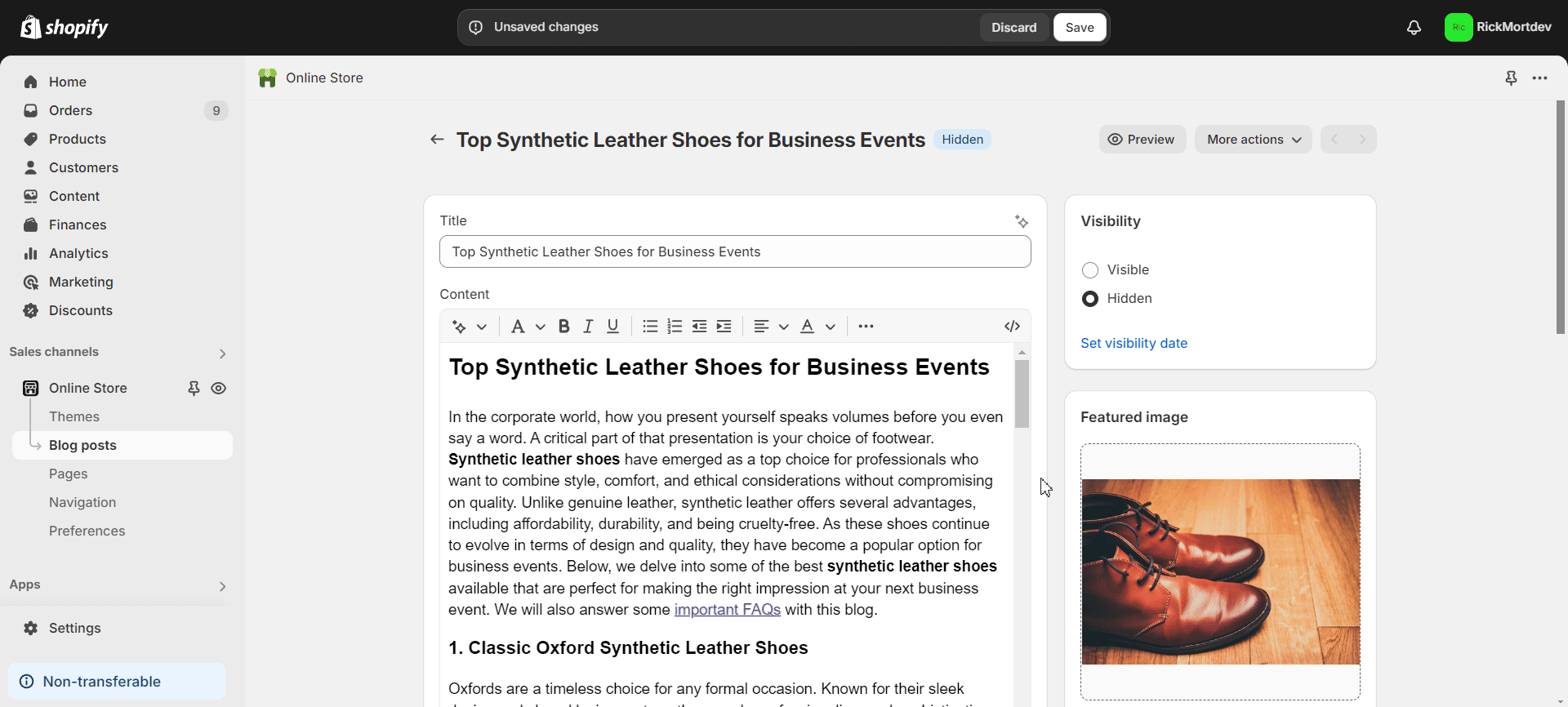
Aggiungi testo alternativo a tutte le immagini #
Se hai più immagini nel post del blog, assicurati che la parola chiave focus sia usata nel testo alt di tutte le immagini. Devi farlo quando modifichi il tuo post del blog dalla dashboard di Shopify come discusso in precedenza. Sotto 'Contenuto' sezione quando modifichi un post del blog, fai doppio clic su qualsiasi immagine all'interno del contenuto del blog. Sarai quindi in grado di aggiungere il testo alt nella sezione 'Testo alternativo dell'immagine' campo.
Le immagini utilizzate nel nostro post del blog contengono testo alternativo pertinente, come mostrato nell'immagine sottostante.
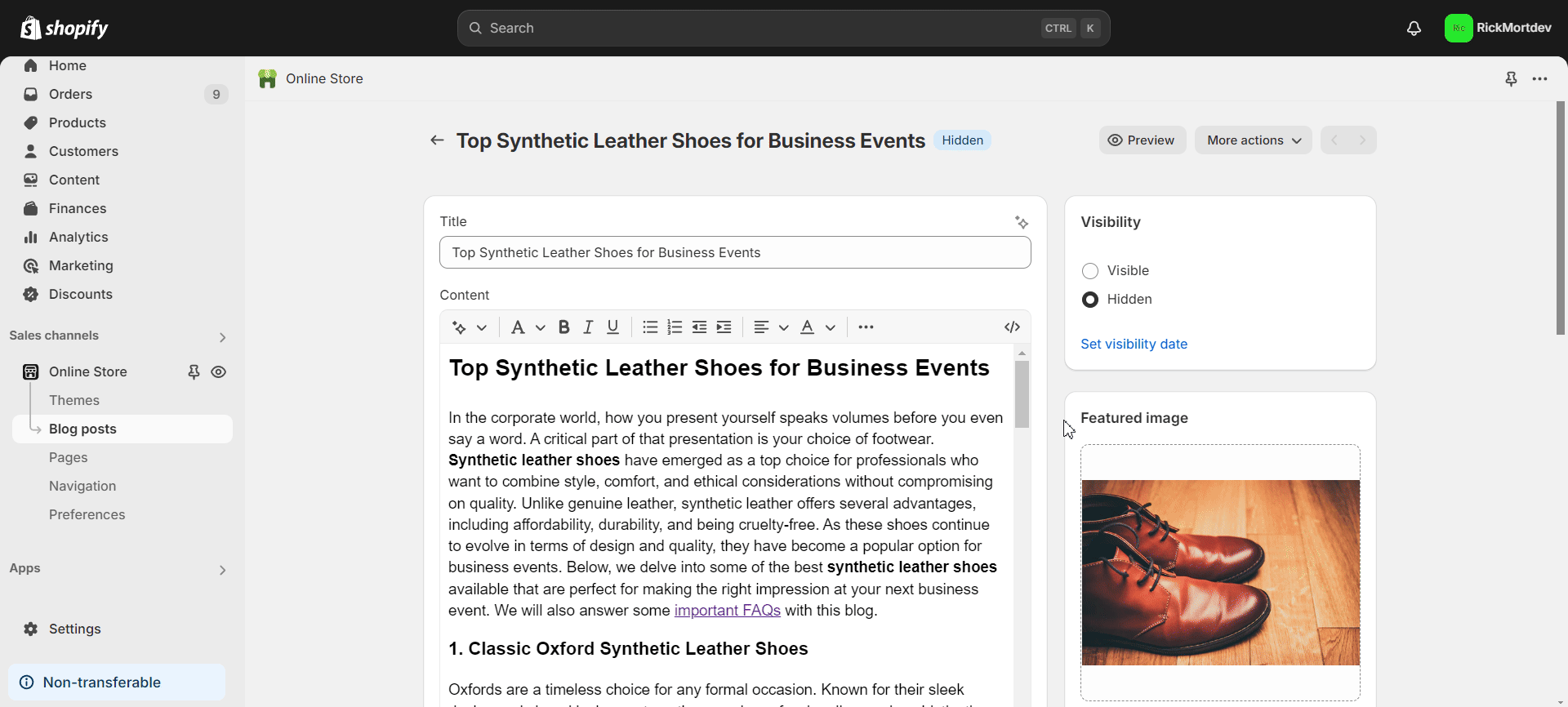
Seguendo questi passaggi, puoi affrontare ogni fattore SEO importante per il miglior punteggio di ottimizzazione possibile per il tuo post del blog. Se hai bisogno di aiuto per ottimizzare i tuoi contenuti per SEO con la potenza dell'IA, puoi anche usare Ottimizzatore di contenuti AI StoreSEO.
Una volta completata l'ottimizzazione del tuo post sul blog e soddisfatto del punteggio SEO complessivo, clicca su 'Salva' pulsante.
Ecco quanto è facile configurare SEO per post e pagine del blog su Shopify usando StoreSEO. Hai bisogno di assistenza? Sentiti libero di contattare il nostro team di supporto dedicato per qualsiasi tipo di richiesta.














